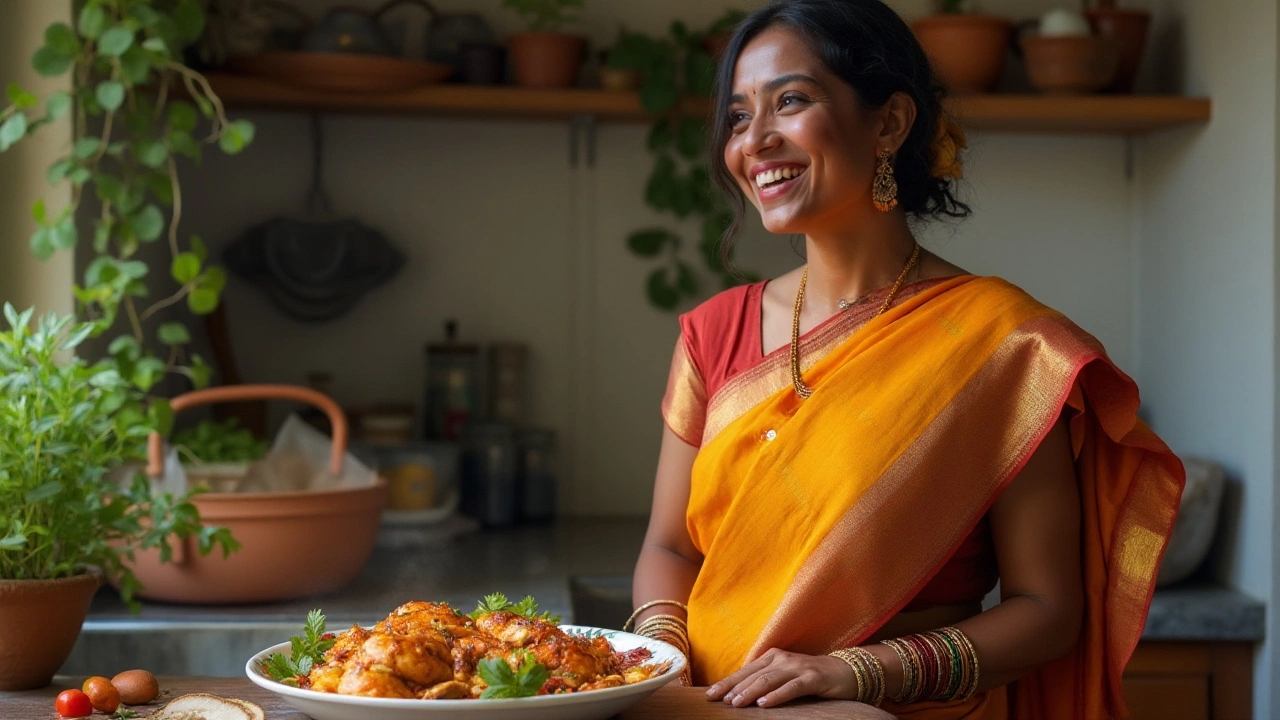In this journey of discovery, we explore the fascinating intersection of spirituality and dietary choices, focusing on religions that advocate minimal meat consumption. Across the globe, many faiths shape the culinary habits of their followers, often promoting a lifestyle that respects all living creatures. This preference often extends to substituting meals with savory and satisfying alternatives.
As we delve into the world of vegetarian religions, we'll uncover the profound principles behind these dietary practices. Whether it's Hinduism, Buddhism, or Jainism, each faith has its own story that emphasizes compassion and restraint. By understanding these perspectives, you might find inspiration to embrace a more mindful way of eating.
For those still appreciating the taste of chicken, this doesn't mean your journey has to be bland or flavorless. We've got delightful recipes catered to those who wish to reduce their meat intake while savoring every bite. Get ready to enhance your culinary repertoire with a blend of tradition, taste, and creativity.
- Religious Teachings and Meat Consumption
- Major Religions Practicing Vegetarianism
- Benefits of Minimal Meat Diets in Religions
- Tasty Chicken Alternatives for Religious Diets
Religious Teachings and Meat Consumption
Religious teachings across the world offer a unique lens through which we can see how food consumption is intertwined with spiritual beliefs and practices. One of the most fascinating aspects of these teachings is their approach to meat consumption, which varies widely among different faiths. In many religious traditions, the choice to eat less meat or none at all is deeply grounded in the principles of compassion, non-violence, and respect for all living beings. For instance, in Buddhism, the first and foremost precept is to abstain from taking life, which naturally extends to the act of consuming meat. This principle of non-harm or 'Ahimsa' as it is known, encourages Buddhists to follow a diet that minimizes the harm inflicted on other creatures.
Within Hinduism, meat consumption is also viewed through a lens of moral and ethical consideration. Hindus who practice vegetarianism often do so as a spiritual commitment, understanding that a diet rich in plant-based foods is more in alignment with the divine will. In certain sects, this practice is strict and includes not only avoiding meat but also abstaining from eggs and fish. The Vedas and other sacred texts provide guidance on maintaining purity, and following a vegetarian diet is one of the ways practitioners can achieve purity of body and soul.
"It is against the will of God to kill animals just for taste of tongue." - Mahatma Gandhi
Turning our gaze to Jainism, perhaps one of the most rigorous proponents of non-violence, or 'Ahimsa', we find an even stricter interpretation. Here, the principle is extended to include not only meat but also root vegetables and legumes that damage plants when harvested. Followers of Jainism are thus encouraged to adopt an entirely plant-based diet, ensuring that their sustenance causes minimal harm to other forms of life. The meticulous care Jains take to avoid harming even the smallest living beings underscores the profound spiritual commitment that shapes their dietary choices.
Moving west, the Abrahamic religions offer varying guidance on meat consumption. Judaism's dietary laws, known as 'Kashrut', provide a framework for what is permissible, combining ethical treatment of animals with ritual. Animals must be slaughtered humanely and the meat prepared according to specific guidelines. Islam's dietary law, or 'Halal', shares similar principles, emphasizing humane slaughter and prohibiting pork, emphasizing the idea that the body is a trust that must be honored. Christians, while generally without strict dietary laws, often practice fasting and observe meat restrictions during Lent as an act of devotion and penance.
The diversity of religious perspectives on meat consumption reveals the significant role faith plays in dietary choices. By understanding these teachings, individuals can not only respect traditions but also find meaningful ways to reflect their own values in their eating habits. To those exploring faith-based diets, the wisdom found in these religious teachings offers an opportunity to embrace a lifestyle that honors both body and spirit, aligning personal beliefs with daily sustenance.

Major Religions Practicing Vegetarianism
In our modern, multicultural world, various religious teachings continue to greatly influence dietary practices, with vegetarianism being a prominent feature in several major faiths. Such diets often stem from deeply rooted beliefs in compassion, non-violence, and respect for all forms of life. Vegetarian religions like Hinduism, Buddhism, and Jainism significantly reduce meat consumption among their followers by advocating plant-based diets. Each religion has distinctive reasons and teachings that guide these practices, offering a wealth of wisdom to those curious about the convergence of faith and food preferences.
Take Hinduism, for example. This ancient religion, followed by over a billion people worldwide, emphasizes 'Ahimsa,' a principle advocating non-violence and harmlessness towards all living creatures. Many Hindus adopt a vegetarian lifestyle as an expression of this belief, seeing it as a way to minimize harm and promote purity. Moreover, Hindu dietary laws often vary based on regional practices, with some communities taking a more lenient approach to meat consumption while others strictly adhere to a vegetarian diet. This flexibility reflects the diverse ways Hinduism is practiced and understood globally.
Buddhism, on the other hand, offers a more nuanced view. While the Buddha did not explicitly prohibit the consumption of meat, many Buddhists choose vegetarianism to cultivate compassion and mindful living. In countries like China and Taiwan, plant-based diets are common amongst Buddhist communities. Monks, particularly in the Mahayana tradition, often follow strict vegan diets to maintain spiritual discipline. By embracing a vegetarian lifestyle, Buddhists seek to foster a sense of unity with all beings, acknowledging the interconnectedness of life.
“There is a constantly evolving understanding that you must tread gently upon the earth. This is closely related to dietary habits that emphasize minimal harm and respect for all creatures.” – Professor of Religious Studies
Then there's Jainism, a religion that takes a particularly rigorous stance on meat and any form of animal harm. This ancient Indian faith, with its foundational principle of non-violence, compels Jains to follow a strict vegetarian diet. In fact, many Jains avoid root vegetables because uprooting them could harm small insects. Their diet is a testament to their commitment to living a life that minimizes harm and violence, demonstrating a profound level of empathy towards all sentient beings. Interestingly, Jain monks and nuns often take additional vows of austerity, further restricting their dietary intake as part of their spiritual advancement.
Even within religions not strictly vegetarian, there are factions and interpretations that advocate for reduced meat consumption. For instance, some sects within Sikhism and Seventh-day Adventist Christianity encourage vegetarian habits as a means to foster health and spiritual well-being. These practices highlight the diversity and adaptability of religious teachings, offering followers the flexibility to integrate personal conviction with traditional guidelines.
As dietary guidelines in religions are diverse and dynamic, individuals can find inspiration and motivation to adopt meatless diets that align with personal beliefs and philosophies. Whether driven by compassion, spiritual discipline, or health considerations, the choice to minimize meat in one's diet stands as a testament to the influential power of faith in shaping lives and communities. Understanding these dietary practices furthers our appreciation for the spiritual dimensions of food, inviting everyone to engage with culinary traditions that transcend mere sustenance to embody values and virtues.

Benefits of Minimal Meat Diets in Religions
Religious practices that promote a minimal meat diet offer a variety of benefits beyond the spiritual realm. Embracing a reduced-meat lifestyle often stems from a deeper philosophy of compassion towards all living beings, rooted in the core teachings of many faiths. For instance, in Buddhism and Jainism, there is a profound respect for life, emphasizing non-violence and empathy. Such principles encourage followers to reduce their reliance on animal products, thereby aligning their dietary habits with the broader spiritual quest for harmony.
Health-wise, adhering to these vegetarian religions' principles can significantly impact an individual's well-being. Numerous studies have ranked plant-based diets highly for their ability to reduce the risk of chronic illnesses, including heart diseases, type 2 diabetes, and certain cancers. By consuming less meat, individuals may enjoy lower cholesterol levels, improved digestion, and an enhanced immune response. In this way, what starts as a religious directive often finds validation in scientific research, creating a synergy of spiritual and physical health.
Environmental sustainability is another compelling benefit associated with minimal meat diets. Livestock farming is a significant contributor to greenhouse gas emissions, deforestation, and water consumption. By choosing a diet with less meat, individuals can actively reduce their carbon footprint, playing a part in addressing global climate change. For faiths like Hinduism, where the reverence for nature is integral, dietary choices become a form of expressing stewardship over the earth. In today's world, where sustainability is paramount, these age-old practices carry newfound relevance.
"The greatness of a nation and its moral progress can be judged by the way its animals are treated." - Mahatma Gandhi
Socially and culturally, these dietary patterns can promote a sense of community and belonging. Shared meals and practices often strengthen bonds among members of faith communities, providing a platform for cultural exchange and understanding. The rituals associated with preparing and eating food can serve as a medium for passing down traditions through generations, preserving the unique flavors and heritage of each religion. In this light, reduced meat diets do more than define what is on the plate; they become colorful threads in the rich tapestry of cultural identity.
Of course, finding delicious and creative alternatives to beloved dishes like chicken can be an exciting endeavor for adherents of these religions. With an abundance of plant-based products available, there is ample opportunity to explore new recipes and flavors, turning mealtime into a culinary adventure. Those embracing meatless diets can benefit from a versatile palette of ingredients that satisfy a broad range of tastes and nutritional needs. Whether it's exploring gluten-free or high-protein options, there's something for everyone keen on making a flavorful transition to a reduced-meat lifestyle.

Tasty Chicken Alternatives for Religious Diets
When it comes to exploring culinary creations within the realm of religious diets, finding the right chicken recipes less reliant on meat can be both rewarding and fascinating. Different religions espouse a range of dietary practices, and many emphasize vegetarianism or a significantly meatless diet approach. Enthusiasts of flavorful dishes will appreciate that leaving out the meat doesn't mean sacrificing taste or satisfaction. Indeed, some of the tastiest meals are rooted in tradition, enriched with texture, and bursting with flavor. For instance, tofu, a staple in Asian cuisines, offers an excellent protein replacement, absorbing marinades and spices with gusto. Consider pre-marinated tofu tikka or spicy stir-fried tofu, both of which bring vibrant flavors reminiscent of Asian and Indian cuisines, delighting both vegetarians and their meat-eating friends.
For a hearty and filling texture, many turn to jackfruit as an innovative substitute. This versatile fruit, renowned for its ability to mimic the texture of pulled pork or shredded chicken, is perfect for crafting delicious meals. Whether it's 'chicken' tacos or a spicy curry, jackfruit's neutral flavor provides the perfect canvas for a range of seasonings. Blending jackfruit with aromatic spices like cumin and smoked paprika unlocks a world of culinary delight that spans cultures and tastes, appealing to a wide range of palates.
Another popular meat alternative is seitan, sometimes lovingly called wheat meat or wheat gluten. Originating over 1,000 years ago in medieval Chinese monasteries, seitan offers a satisfying, chewy texture similar to meat. For religious diets, seitan can easily step in to create a myriad of dishes like aromatic stir-fries, savory stews, and even grilled kebabs. A touch of soy sauce and ginger can elevate seitan's taste, while the right baking or broiling techniques can further enhance its satisfying chewiness in salads or wraps.
For those who require a bit more inspiration, incorporating legumes or lentils into meals creates hearty and wholesome dishes. Both are celebrated in different regions for their protein content and ease of integration into various recipes. From spicy lentil curries to comforting chickpea pot pies, legumes offer a robust option that satisfies and nourishes. Recent studies have shown a growing trend in adopting meatless diets due to both health and environmental concerns. According to the Journal of Nutrition and Food Sciences, societies practicing vegetarian diets contribute to lower carbon footprints, highlighting an additional benefit to embracing these alternatives.
"To eat is a necessity, but to eat intelligently is an art." – Francois de La Rochefoucauld
In our exploration of these tantalizing alternatives, embracing creativity in the kitchen is key. By focusing on flavors, textures, and nutrient balance, one can transform simple ingredients into delicious meals that celebrate diversity and tradition. These chicken alternatives are not only compatible with various religious dietary practices but also bring a fresh perspective to how we view our meals. So, why not start with some of these tempting substitutes and get ready to immerse yourself in recipes that offer more than just sustenance? The opportunities are endless, and flavors await discovery at every corner of your kitchen.

